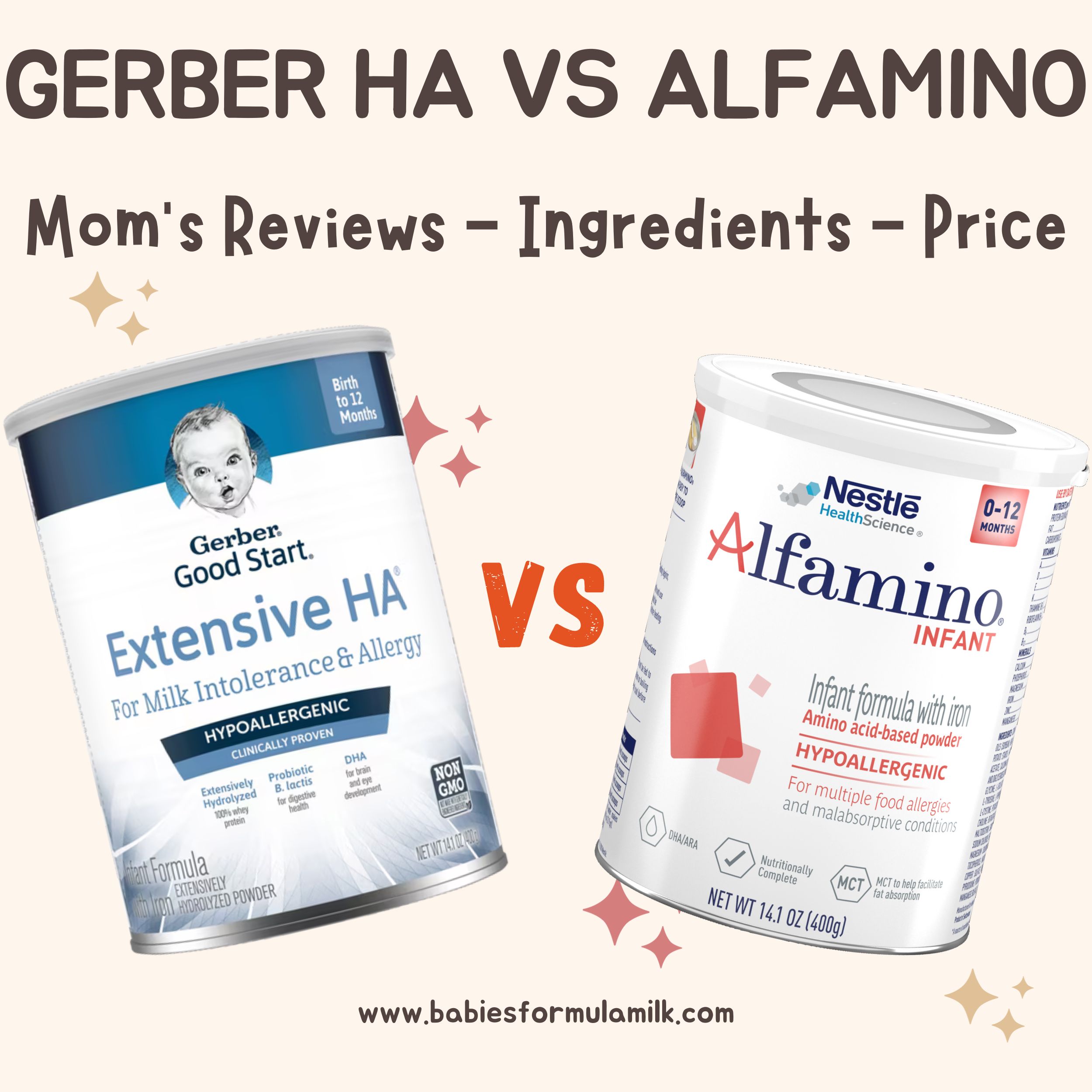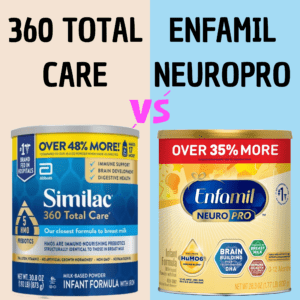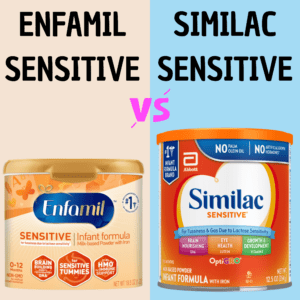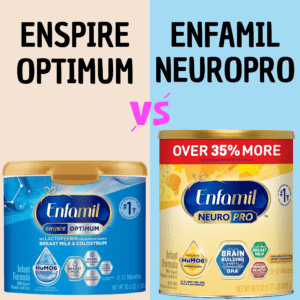Key Differences:
Alfamino is an amino acid formula suitable for severe allergies (CMPA, Eosinophilic GI disorders, Malabsorption conditions, Short bowel syndrome) while Gerber Extensive HA is an extensively hydrolyzed formula designed for infants with milder allergies (CMPA). The choice between them depends on the severity of your baby’s allergic reactions.

“When you buy something using my links, I may earn a small commission at no additional cost to you. This is a kind of support to me. This website doesn’t accept money for reviews. “
The Best One?
The choice between Gerber Extensive HA and Alfamino ultimately depends on the specific dietary needs and preferences of your baby, as well as your budget considerations.
- Gerber Extensive HA appears to be an excellent choice for infants with cow’s milk protein and lactose intolerances. It’s also GMO-free and beneficial for casein allergy. The formula’s ability to promote regular bowel movements, reduce gas, and alleviate diaper rash is noteworthy. Moreover, it is a cost-effective option, making it suitable for families on a budget.
- Alfamino, on the other hand, is particularly well-suited for babies with severe allergies like Cow’s Milk Protein Allergy (CMPA), lactose intolerance, and gluten sensitivity. It has demonstrated effectiveness in managing reflux and tummy problems while aiding in healthy weight gain. Additionally, its enrichment with vitamins and minerals contributes to overall nutrition.
Mom’s Reviews Comparison:

Certainly, let’s provide a bit more context to each aspect of the comparison between Gerber Extensive HA and Alfamino:
Gerber Extensive HA:
Positive Reviews:
- Effective for CMPA: Parents have lauded Gerber Extensive HA for its effectiveness in addressing Cow’s Milk Protein Allergy (CMPA), a common condition in infants. It has helped alleviate the symptoms associated with this allergy, providing relief to both babies and parents.
- Helps with Gas, Reflux, and Diaper Rash: Many parents have reported that using Gerber Extensive HA has led to a significant reduction in common issues such as gas, reflux, and diaper rash. This has contributed to more comfortable and contented babies.
- Supports Regular Bowel Movements: A well-functioning digestive system is essential for a baby’s well-being, and Gerber Extensive HA has earned praise for promoting regular bowel movements.
- Milder Odor in Powder Form: Compared to some other hypoallergenic formulas, the powdered version of Gerber Extensive HA is appreciated for having a less offensive smell.
- GMO-Free: In an era of heightened awareness about food ingredients, the fact that Gerber Extensive HA is GMO-free is seen as a significant advantage by parents seeking healthier choices for their infants.
Negative Reviews:
- Relatively Expensive: While effective, some parents consider Gerber Extensive HA to be on the expensive side. However, it’s noted that it is more budget-friendly compared to some other specialized hypoallergenic formula options.
- Limited Availability in Physical Stores: Finding Gerber Extensive HA in local stores can be challenging, especially, since it has one size can (14.1 oz), leading to inconvenience for parents who rely on easy access to formula.
- Taste Preferences: Some babies may find the taste of Gerber Extensive HA less agreeable, which can make feeding sessions more challenging for both parents and infants.
- Potential Digestive Issues: A minority of babies may experience constipation and reflux with choking when consuming this formula, which can be a concern for parents because every baby is different and each one may tolerate specific formulas and doesn’t tolerate other ones.
- Smaller Can Sizes: Some parents have expressed frustration with the smaller can sizes, as they may not last as long as larger containers, requiring more frequent purchases.
Related: EleCare VS Gerber Extensive HA: What’s The Difference?
Alfamino:
Positive Reviews:
- Effective for CMPA and GI Disorders: Alfamino has received acclaim for its efficacy in addressing Cow’s Milk Protein Allergy (CMPA).
- Suitable for Lactose Intolerance: For infants with lactose intolerance, Alfamino has been a go-to choice, providing nutrition without the discomfort caused by lactose-containing formulas.
- Helps Alleviate Reflux and Tummy Problems: Parents have reported that Alfamino is effective in reducing reflux and soothing tummy troubles, which can significantly improve a baby’s comfort and well-being.
- Supports Healthy Weight Gain: Nutrient-rich Alfamino has played a crucial role in helping some babies achieve healthy weight gain, particularly important for those who may have struggled with growth.
Negative Reviews:
- Relatively Expensive: Alfamino is considered relatively expensive, almost double the price of Gerber Extensive HA, which can be a concern for budget-conscious parents.
- Taste and Smell: Some parents have expressed dissatisfaction with the taste and smell of Alfamino, finding it unappealing, which can make feeding sessions challenging.
- Dissolution in Water: There have been complaints about Alfamino not dissolving well in water, which can lead to clumping or difficulties in preparation.
- Limited Availability in Physical Stores: Similar to Gerber Extensive HA, Alfamino can be challenging to find in local stores, requiring parents to plan their purchases accordingly.
- Spit-Up Issues: A few parents have observed that their babies experienced increased spit-up when using Alfamino, which may be a consideration for those with infants prone to this issue.
Ingredients Comparison:
Protein Source:
The primary difference in protein source between Gerber Extensive HA and Alfamino lies in their composition:
- Gerber Extensive HA: This formula relies on extensively hydrolyzed whey protein as its protein source. Extensive hydrolyzation means that the whey protein is broken down into smaller fragments, making it easier for infants with Cow’s Milk Protein Allergy (CMPA) to digest. It’s a suitable choice for babies with milder allergic reactions.
- Alfamino: In contrast, Alfamino utilizes free amino acids as its protein source. Free amino acids are the building blocks of proteins and are in their simplest, pre-digested form. This makes Alfamino an excellent choice for babies with severe allergies or those who may not tolerate more complex protein structures.
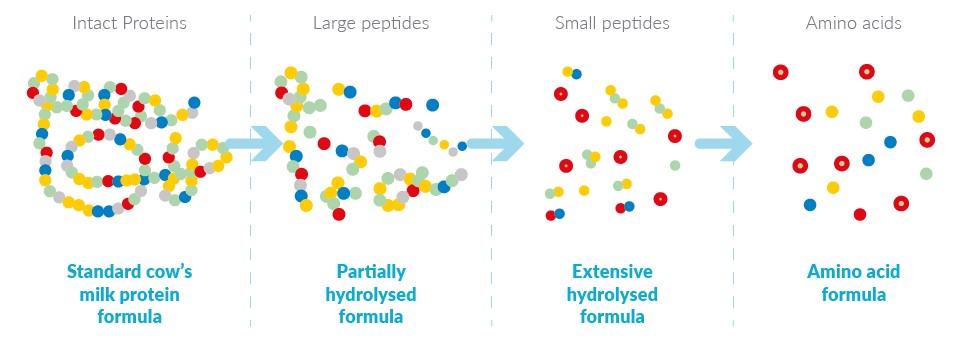
Carbohydrate Source:
The carbohydrate sources in Gerber Extensive HA and Alfamino differ as follows:
- Gerber Extensive HA: This formula contains a combination of 90% corn maltodextrin and 10% potato starch. Corn maltodextrin is a carbohydrate derived from corn, and potato starch is sourced from potatoes. This blend is designed to provide easily digestible carbohydrates for infants with specific dietary needs.
- Alfamino: Alfamino, on the other hand, uses corn syrup solids and potato starch as its carbohydrate sources. Corn syrup solids are another form of carbohydrate derived from corn, while potato starch comes from potatoes. This combination is intended to offer an alternative carbohydrate profile suitable for infants with severe allergies or sensitivities.
Related: Gerber Extensive HA VS Neocate: What’s The Difference?
Fat Source:
The fat sources in Gerber Extensive HA and Alfamino are almost similar:
Gerber Extensive HA:
- Contains a unique blend of fats, with 46% Medium Chain Triglycerides (MCT) being a notable component. MCTs are easily digestible fats that can be helpful for infants with certain digestive issues.
- Also includes 28% soy oil, 10% high oleic sunflower oil, 6% high 2-palmitic vegetable oil, and 5% CITREM, which is an emulsifier used to mix fats and water in the formula.
Alfamino:
- Features 43% medium chain triglycerides (MCT), similar to Gerber Extensive HA. These MCTs contribute to easier digestion.
- Additionally, it contains soybean oil, high oleic sunflower oil, and high 2-palmitic vegetable oil, which provide a mix of fats necessary for balanced nutrition.
While both formulas incorporate MCTs for improved digestion, Gerber Extensive HA includes a unique emulsifier (CITREM) and a different blend of fats compared to Alfamino.
Prebiotics/Probiotics:
In terms of prebiotics and probiotics:
Gerber Extensive HA:
- Contains the probiotic B. Lactis, which can support a healthy gut microbiome by introducing beneficial bacteria.
- However, it lacks a prebiotic, which is a non-digestible compound that serves as food for probiotics, helping them thrive and function effectively.
Alfamino:
- Does not contain either prebiotics or probiotics. It does not include any specific beneficial bacteria or compounds to support gut health.
GMO:
In terms of GMOs:
- Gerber Extensive HA: This formula is GMO-free, meaning it does not contain genetically modified organisms. This can be a significant factor for parents who prioritize non-GMO products for their infants.
- Alfamino: Alfamino is not GMO-free; it may contain ingredients derived from genetically modified sources. Parents who are concerned about GMOs may need to consider this aspect when choosing this formula.
Most amino acid formulas are not GMO-free except Puramino, that’s why I did a full comparison between Puramino and Gerber Extensive HA if you want to check.
Nutrients Comparison:

Micronutrients:
In terms of micronutrients, both formulas have almost the same fat and carbohydrate levels but Alfamino has been enriched more with protein.
Vitamins:
When comparing Gerber Extensive HA and Alfamino in terms of vitamins:
- Alfamino: Alfamino stands out by providing higher levels of essential vitamins, including Vitamin A, Vitamin D, Vitamin B1 (Thiamine), Vitamin B2 (Riboflavin), Vitamin B6, Niacin, Pantothenic acid, and Biotin. These elevated vitamin levels may contribute to enhanced overall nutrition for infants who require specialized formula.
- Gerber Extensive HA: While Gerber Extensive HA offers balanced nutrition, it may have slightly lower levels of these vitamins compared to Alfamino due to its different formulation. However, it still meets the nutritional requirements for infants with specific dietary needs.
Related: Alimentum RTF Vs Alfamino: Which One To Choose?
Minerals:

When comparing Gerber Extensive HA and Alfamino in terms of minerals:
- Alfamino: Alfamino stands out by providing higher levels of essential minerals, including Calcium, Phosphorus, Zinc, Manganese, Copper, Selenium, Chloride, Potassium, and Sodium. These increased mineral levels may contribute to enhanced overall nutrition for infants who require specialized formula.
- Gerber Extensive HA: While Gerber Extensive HA offers balanced nutrition, it may have slightly lower levels of these minerals compared to Alfamino due to its different formulation. However, it still meets the nutritional requirements for infants with specific dietary needs.
Price Comparison:
| Alfamino | Gerber Extensive HA |
|---|---|
| 48.56 $ 14.1 oz 3.44 /oz Buy HERE | 14.1 oz 26.47 $ 1.88 /oz Buy HERE |
| No Liquid | No Liquid |
| 4.3 of 5.0 15 Rating (Nestle) | 4.1 of 5.0 134 Rating (Walmart) |
In terms of price:
- Gerber Extensive HA: This formula is more budget-friendly, costing approximately $1.88 per ounce for the 14.1 oz container.
- Alfamino: Alfamino is comparatively more expensive, priced at approximately $3.44 per ounce for the same 14.1 oz container.
While Gerber Extensive HA offers a more cost-effective option, it’s important to consider your baby’s specific dietary needs and consult with a healthcare professional to determine which formula is the best choice. Budget considerations can play a role, but ensuring that your baby receives the appropriate nutrition is of paramount importance.
How to Switch From Gerber Extensive HA to Alfamino?
Switching from one infant formula to another, such as transitioning from Gerber Extensive HA to Alfamino, should be done gradually to minimize any potential discomfort or digestive issues for your baby. Here are steps to make the transition as smooth as possible:
- Consult with a Healthcare Professional: Before making any changes to your baby’s diet, it’s crucial to consult with your pediatrician or healthcare provider. They can provide personalized guidance based on your baby’s specific dietary needs and any underlying medical conditions.
- Purchase Alfamino: Ensure you have a sufficient supply of Alfamino before starting the transition. Purchase the formula in advance to avoid any interruptions in feeding.
- Prepare Equipment: Clean and sterilize all bottles, nipples, and other feeding equipment you’ll be using with Alfamino. This helps maintain proper hygiene during the transition.
- Start Slowly: Begin by mixing the two formulas together. You can start with a small amount of Alfamino and gradually increase it over several days. For example:
- Days 1-3: Mix 25% Alfamino with 75% Gerber Extensive HA.
- Days 4-6: Mix 50% Alfamino with 50% Gerber Extensive HA.
- Days 7-9: Mix 75% Alfamino with 25% Gerber Extensive HA.
- Day 10 and onward: Transition to 100% Alfamino if your baby tolerates it well.
- Observe Your Baby: Be vigilant about observing your baby’s responses as you make the transition. Keep an eye out for any indications of discomfort, allergic reactions, or digestive problems. If you notice any adverse reactions, consult with your healthcare provider for further guidance.
- Maintain Adequate Hydration: Ensure your baby is getting enough fluids, especially during the transition. You may need to offer water or breast milk/formula between feedings to prevent dehydration.
- Monitor Stool Changes: Be prepared for potential changes in your baby’s stool pattern as they adjust to the new formula. I have made a full guide about What Does a Hypoallergenic Formula Poop Looks Like? if you want to check.
- Keep a Feeding Schedule: Stick to a regular feeding schedule to provide consistency for your baby during the transition.
- Be Patient: Every baby reacts differently to formula changes. Some may adapt quickly, while others may take more time. Patience is key during this process.
- Seek Professional Guidance: If you encounter any difficulties during the transition or have concerns about your baby’s health or nutrition, don’t hesitate to reach out to your healthcare provider for guidance and support.
Remember that the transition from one formula to another can take time and patience. It’s essential to prioritize your baby’s comfort and well-being throughout the process and seek professional advice when needed.

